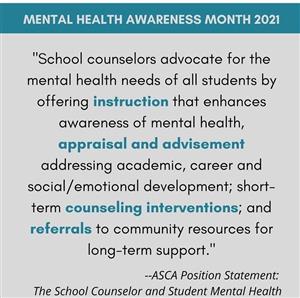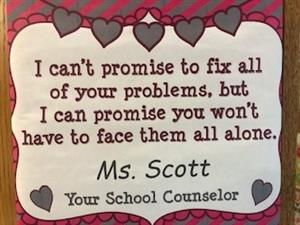-
Name: Ms. Lauren Scott, M. Ed.Title: Certified School Counselor, K-12Hello Hillside!

_____________________________________________
Anxiety is the number one issue I deal with in my work with students. So much so that I teach about it in First Grade. Some might wonder why so young and what is happening that we have so many anxious children? We live in an anxiety fueling world where adults stuggle to manage their anxiety. Anxiety is highly contagious and our children are vulnerable to our feelings which leads them to feel all our feels with us. When we are disregulated--our feelings are in control of us--our children often follow suit. They take their emotional cues from us. It is our job as adults to take care of our feelings so that our children can trust that the adults are effectively in charge. This frees them up to manage only their feelings which is a BIG job for a little person! We work hard at learning about feelings and how to manage them at Hillside. If you have concerns that your child is struggling with their feelings, please reach out to me. There are tons of tools that might help. Check out the Love & Logic section for more.
I will continue to post articles and items of interest. Please reach out via email at ScottL@tesd.net or 610-240-1504 if you have any questions or concerns about your student.
___________________________________________________________________________________________________
How do I know when to seek treatment for my child's mental health and learning challenges?
Child Mind institute has a fantastic resource for families trying to determine when they need to seek assistance for their childs mental health and learning needs. Your child's teacher is the place to start this conversation and you can contact me for next steps. The following article is a good introduction to seeking help. Click this link for more Child Mind-Connect to Care.
Why Get Care?
There are many things that may prompt you to wonder whether you should seek mental health care for a child. Some have to do with mood: your child is unhappy or irritable or anxious a lot of the time. Some have to do with behavior: they are disruptive in school, in conflict at home, throw tantrums or can’t get along with other children. Some have to do with development: they’re not speaking or interacting like other kids their age.
Whatever the problem is, it can be hard to decide whether help is needed. Here are some reasons why getting care for your child may be a good idea.
Kids don’t usually grow out of mental health problems
Emotional and behavior problems that go untreated don’t usually get better on their own. Children are less likely to “grow out” of them than they are to “grow into” more serious conditions. Anxiety gets worse over time, not better. Behavior problems that are tolerable when kids are young can become out-of-control and even dangerous as they get older.
Early treatment works better
With most mental health problems, the earlier kids get treatment, the more effective it is. Children, whose brains are still developing, are much more able to “unlearn” negative ways of thinking or behaving than adults are. Most mental health problems left untreated in childhood become more difficult to treat in adulthood.
Kids who are struggling miss out on a lot
There are big costs to a child who goes for years without getting care. Kids who are struggling with anxiety or depression are not only in distress, they are missing out on important experiences. When they avoid activities because they are anxious or sad, they miss out on chances to build confidence as well as social skills.
Kids who are struggling develop poor self-esteem
Kids who can’t control their behavior — who act out in school, who have trouble making friends, who clash with the important adults in their lives — get a lot of negative feedback. They can start to think of themselves as bad. And kids who are having difficulty keeping up with other kids in school, because of attention or learning challenges, start to think that there is something wrong with them. Or that they’re stupid. All of these things undermine their self-esteem.
Care can help the whole family
There are no guarantees that help from a mental health professional will solve all of a child’s problems. Butdiagnosis and treatment can turn things around for kids who are struggling, and set them up to be happier, more successful adults. And because the whole family is affected by a child who is struggling, the right treatment can make the whole family feel better.
Return to Connect to Care for more information about getting kids help.
____________________________________________________________________________________________________________________________________________
During these times of isolation, it makes sense that you might be considering opening up your tween girl's world a bit through social media. For many kids—both girls and boys—it can foster connection and social ties. But for a small subset of girls, like those who are especially vulnerable to the negative aspects of social media, research indicates that it's better to wait.
____________________________________________________________________________________________________________________________
PREVIOUS POSTS
1. During the coronavirus crisis, the Child Mind Institute has been publishing daily tips from our experts to support families. Starting this week, as states begin to reopen, we will change the frequency to twice weekly, Mondays and Fridays and start to focus on reopening topics. And today we’d like to share with you our recent Facebook Live on another pressing issue: talking to kids about the racism, violence and unrest following the death of George Floyd.
Racism and Violence: How to Help Kids Handle the News
https://www.facebook.com/watch/live/?v=673076123472542&ref=watch_permalink
Wellness Tip for the DayFrom Child Mind InstituteMAKE HEALTHY CHOICES
Binging on snacks or TV may feel good in the moment but hurts you in the long run. Here are some tips for maintaining healthy habits:- Plan nutritious meals
- Exercise regularly
- Try to get 8 hours of sleep
- Enjoy snacks in moderation
Wednesday Tip for the DayFrom Child Mind InstituteUSE ‘EMOTIONAL DISTANCING’
It’s hard not to internalize the anxiety of others, especially with overwhelming updates from friends, phones and the news. Set healthy boundaries by:- Taking a break from the news
- Turning off your phone notifications
- Waiting to reconnect until after you’ve decompressed
Friday Tip for the Dayfrom Child Mind InstituteUSE ATTENTION TO MANAGE BEHAVIOR
Kids will naturally crave attention while stuck at home all day. Parents can give attention thoughtfully to encourage good behavior:- Give generous praise for being flexible.
- “Actively ignore" (don't acknowledge) minor problem behavior.
- Use time together as a motivator: “We can play a game if you do your schoolwork while I take this call.”
Thursday Tip for the Dayfrom Child Mind InstituteENCOURAGE OPEN CONVERSATION
You may not feel like you have all the answers, but it’s important to encourage children to ask questions. Here’s how:- Model calm behavior while providing information in a developmentally appropriate way
- Provide reassurance, empathy and encouragement in the face of uncertainty.
- For example, "I know things are different, but we will get through it together.
A story for kids about social distancing https://youtu.be/DA_SsZFYw0wTuesday Tip for the Day:from Child Mind InstituteFOCUS ON THE POSITIVE:
https://youtu.be/DA_SsZFYw0wTuesday Tip for the Day:from Child Mind InstituteFOCUS ON THE POSITIVE:In this time, parents can manage anxiety (yours and your children’s) by remaining optimistic.
- Remind the family that experts are working hard to contain the virus
- Don’t dwell on hypothetical worst-case scenarios
- Maintain agency over what you can control — meals, bedtime, homework, hugs.
Monday Tip for the Day:From Child Mind InstituteKEEP YOUR SCHEDULES FRESH
When developing at-home schedules, try to alternate between activities kids enjoy (like playing or screen time) with less popular tasks (like chores or homework).- Variety helps kids focus and gives parents a break.
- Remember, this also applies to your schedule: alternate between work and family time.
- Don't forget to give yourself some “me time.”
Monday 3/30/2020 Topic: Supporting Different Learning Styles at Home________________________________________________________________________________________________________________Stay well!Grade: K-4 Room: Counselor's OfficeEmail: ScottL@tesd.netPhone: 610-240-1504
Room: Counselor's OfficeEmail: ScottL@tesd.netPhone: 610-240-1504



